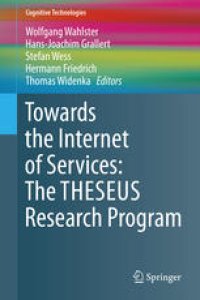
Ebook: Towards the Internet of Services: The THESEUS Research Program
- Tags: Artificial Intelligence (incl. Robotics), Industrial and Production Engineering, Production/Logistics/Supply Chain Management, User Interfaces and Human Computer Interaction, Computer Communication Networks
- Series: Cognitive Technologies
- Year: 2014
- Publisher: Springer International Publishing
- Edition: 1
- Language: English
- pdf
The Internet of Services and the Internet of Things are major building blocks of the Future Internet. The digital enterprise of the future is based not only on mobile, social, and cloud technologies, but also on semantic technologies and the future Internet of Everything. Semantic technologies now enable mass customization for the delivery of goods and services that meet individual customer needs and tastes with near mass production efficiency and reliability. This is creating a competitive advantage in the industrial economy, the service economy, and the emerging data economy, leading to smart products, smart services, and smart data, all adaptable to specific tasks, locations, situations, and contexts of smart spaces. Such technologies allow us to describe, revise, and adapt the characteristics, functions, processes, and usage patterns of customization targets on the basis of machine-understandable content representation that enables automated processing and information sharing between human and software agents.
This book explains the principal achievements of the Theseus research program, one of the central programs in the German government's Digital 2015 initiative and its High-Tech Strategy 2020. The methods, toolsets, and standards for semantic technologies developed during this program form a solid basis for the fourth industrial revolution (Industrie 4.0), the hybrid service economy, and the transformation of big data into useful smart data for the emerging data economy.
The contributing authors are leading scientists and engineers, representing world-class academic and industrial research teams, and the ideas, technologies, and representative use cases they describe in the book derive from results in multidisciplinary fields, such as the Internet of Services; the Semantic Web, and semantic technologies, knowledge management, and search; user interfaces, multimodal interaction, and visualization; machine learning and data mining; and business process support, manufacturing, automation, medical systems, and integrated service engineering.
The book will be of value to both researchers and practitioners in these domains.
The Internet of Services and the Internet of Things are major building blocks of the Future Internet. The digital enterprise of the future is based not only on mobile, social, and cloud technologies, but also on semantic technologies and the future Internet of Everything. Semantic technologies now enable mass customization for the delivery of goods and services that meet individual customer needs and tastes with near mass production efficiency and reliability. This is creating a competitive advantage in the industrial economy, the service economy, and the emerging data economy, leading to smart products, smart services, and smart data, all adaptable to specific tasks, locations, situations, and contexts of smart spaces. Such technologies allow us to describe, revise, and adapt the characteristics, functions, processes, and usage patterns of customization targets on the basis of machine-understandable content representation that enables automated processing and information sharing between human and software agents.
This book explains the principal achievements of the Theseus research program, one of the central programs in the German government's Digital 2015 initiative and its High-Tech Strategy 2020. The methods, toolsets, and standards for semantic technologies developed during this program form a solid basis for the fourth industrial revolution (Industrie 4.0), the hybrid service economy, and the transformation of big data into useful smart data for the emerging data economy.
The contributing authors are leading scientists and engineers, representing world-class academic and industrial research teams, and the ideas, technologies, and representative use cases they describe in the book derive from results in multidisciplinary fields, such as the Internet of Services; the Semantic Web, and semantic technologies, knowledge management, and search; user interfaces, multimodal interaction, and visualization; machine learning and data mining; and business process support, manufacturing, automation, medical systems, and integrated service engineering.
The book will be of value to both researchers and practitioners in these domains.